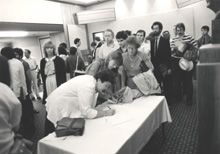Air India disaster hit Concordia hard

An interfaith service was held for the victims of the Air India disaster on June 28, 1985 in the D.B. Clarke Theatre, and after the ceremony, people were invited to sign a book dedicated to the ones who died. These photos appeared in the Thursday Report issue dated Aug. 29, 1985, and were supplied by University Archives.
File Photo
The recent court decision in the Air India bombing, which remains Canada’s worst mass murder, prompted University Archivist Nancy Marrelli to send CTR material from that terrible event 20 years ago.
On March 17, two men were acquitted of conspiracy and murder in the 1985 bombing of Air India Flight 182, which blew up near the coast of Ireland, killing everyone on board.
Of the 329 victims, many had connections with Concordia, and their loss was marked by a memorial service at the university. A news release issued June 28, 1985, five days after the event, lists those who lost their lives. They were:
Balvir Singh, a 46-year-old professor of economics, with his wife, two-year-old daughters and a son.
Gyan Chandra Upreti, 44, who was replacing a physics professor on sabbatical. He died with his wife and son.
Nish Mukerji, 51, who had just received his PhD in physics and was returning to India with his wife for a visit. He also taught at Loyola High School.
Sukavanam Venkatesan, 32, had just got his Master’s in Electrical Engineering, and died with his wife.
Brij Srivastava, 40, was doing a doctorate in Building Engineering.
Also on the flight were the wife, two children and mother-in-law of Mahesh Sharma, a lecturer in the Faculty of Commerce and Administration, who had just won a teaching award.
Michael Chatlani, a 19-year-old engineering student, lost his mother, sister and brother.
End of long trial brings back memories
Eisha Marjara knew the evidence was circumstantial and thought she was prepared for the verdict in the drawn-out Air India trial, “but when the result came out, I was totally unprepared and numb with shock.
“The acquittal triggered a queer revisit into the past, back to the summer of 1985 when the bombing took place. In just a matter of days, the shock and disbelief, the frenzy of flying to Ireland to identify the bodies, the rapid assembly-line funeral ceremony in Dublin, followed by a return home to a dead silence, all came back.”
Marjara was a 19-year-old Communication Studies student that spring. She was in hospital, and had been given a weekend pass to attend her younger sister’s high school graduation and say goodbye to her and her mother, who were flying to India.
“The morning after their departure, my father and I discovered from news reports that the plane they were on ‘had crashed’ off the coast of Ireland. It was only much later we discovered that the plane had actually exploded as a result of a bomb.” Eisha, her father and her older sister were left to mourn their loss.
In 1994 Marjara was selected by the National Film Board’s Fast Forward Program to make a film on the theme of the disaster. She recalls the next five years as “an arduous journey, riddled with script and structural problems, technical complications and necessary emotional breakdowns.
“I made several research trips, one to India, one to my hometown in Trois-Rivières, accumulated loads of material and tackled a script, but to no avail: it became a desperate search for a story.
“Almost three years later, I had a breakthrough, [but] I didn’t begin scriptwriting until I was in the editing room where the film was pieced together.”
The film was called Desperately Seeking Helen. In it, she goes back to India to search for a film idol from her childhood in the glittering world of Bollywood cinema.
“Helen is a conduit into my childhood — my relationship with my mother, my struggle with anorexia and the Air India disaster which took the lives of my mother and sister.”
Marjara’s film professor was delighted by her innovative treatment of the subject, and her family were proud.
“Many of my friends had worked in the film, including a former Concordia student, Kathy Sperberg, and Sydney Chen, who was a student of professor Iain Cook in the Sound III class.”
The film got a lot of attention from the media when it was released in 1999. Marjara’s worries about mixing her own intensely personal story with references to commercial Indian cinema, with its extravagant use of melodrama, fantasy and camp, proved needless.
Now she is following the aftermath of the Air India verdict. “I hope that if an appeal does not take place, then a public inquiry will.”
She was pleased by the support for the victims’ families from the public and the media during the long trial.
“I feel privileged to have had the opportunity to make a film to keep the victims’ memory alive.”
Marjara is still a filmmaker. She is currently finishing a short drama she shot in Germany, writing a feature film script, and developing a documentary for the NFB.